In recent years, the interest in natural solutions for boosting brain function has surged, and one unexpected player has emerged in this cognitive renaissance: body feel shrooms. Once relegated to the fringes of alternative medicine, these uniquely named fungi are now gaining recognition for their potential to improve memory, sharpen focus, and elevate mental clarity. As science catches up with centuries-old traditions, researchers are beginning to uncover the surprising neurological benefits that these psychoactive mushrooms offer. For those wondering how do shrooms work or what do magic mushrooms do to your brain, the answers lie at the intersection of neurochemistry, plant-based medicine, and the human quest for mental optimization.
You may also like: The Ultimate Guide to the Best Nootropic Mushrooms for Memory and Cognitive Enhancement
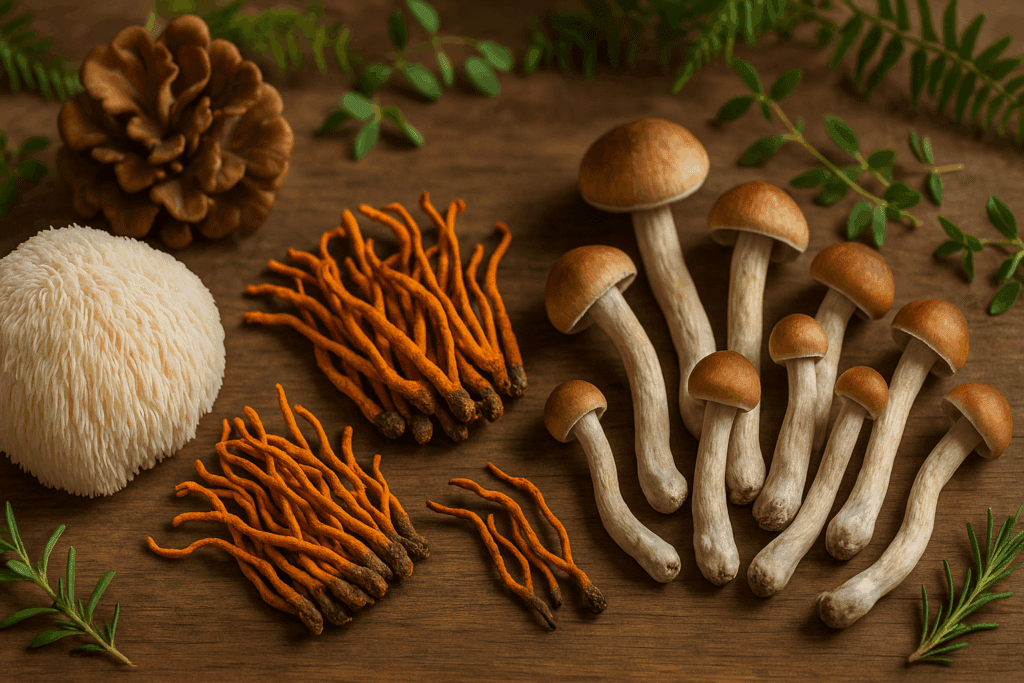
Understanding the Rise of Nootropic Mushrooms
The term “nootropic” refers to substances that enhance cognitive function, particularly executive functions like memory, creativity, and motivation. While synthetic nootropics have existed for decades, there’s growing enthusiasm for naturally occurring alternatives, particularly those derived from fungi. Nootropic mushrooms, such as Lion’s Mane, Cordyceps, and psilocybin-containing species, are rich in compounds that interact with the brain’s neurochemical pathways.
Body feel shrooms, a term often used to describe certain psilocybin mushrooms, differ from other functional mushrooms due to their psychoactive and sensory-enhancing properties. These mushrooms produce not only cognitive but also somatic effects, which is where the term “body feel” originates. Individuals often report enhanced bodily sensations, a grounding sense of presence, and improved interoceptive awareness during a magic mushroom trip.
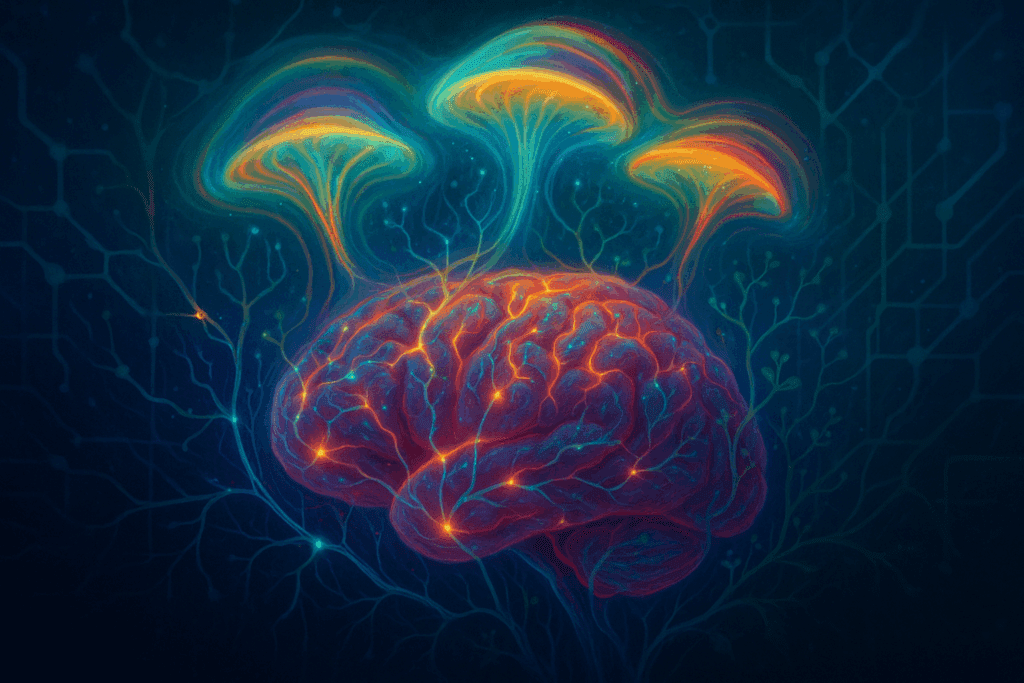
Body Feel Shrooms and the Brain: What Do They Actually Do?
One of the most compelling aspects of body feel shrooms is how they influence the brain’s neuroplasticity. Psilocybin, the active compound in many psychedelic mushrooms, binds to serotonin receptors, particularly the 5-HT2A subtype. This interaction can lead to a cascade of effects, including the proliferation of dendritic spines and increased synaptic connectivity. For individuals exploring what do shrooms do to your brain, these structural changes suggest a remodeling of neural pathways that underlie learning and memory.
Moreover, research indicates that psilocybin may reduce activity in the brain’s default mode network (DMN), a cluster of regions associated with rumination, self-referential thought, and overactive mental chatter. By dampening DMN activity, body feel shrooms help create a mental environment conducive to clarity, creativity, and cognitive flexibility. These effects contribute to why many users describe a magic mushroom experience as enlightening or mind-expanding.
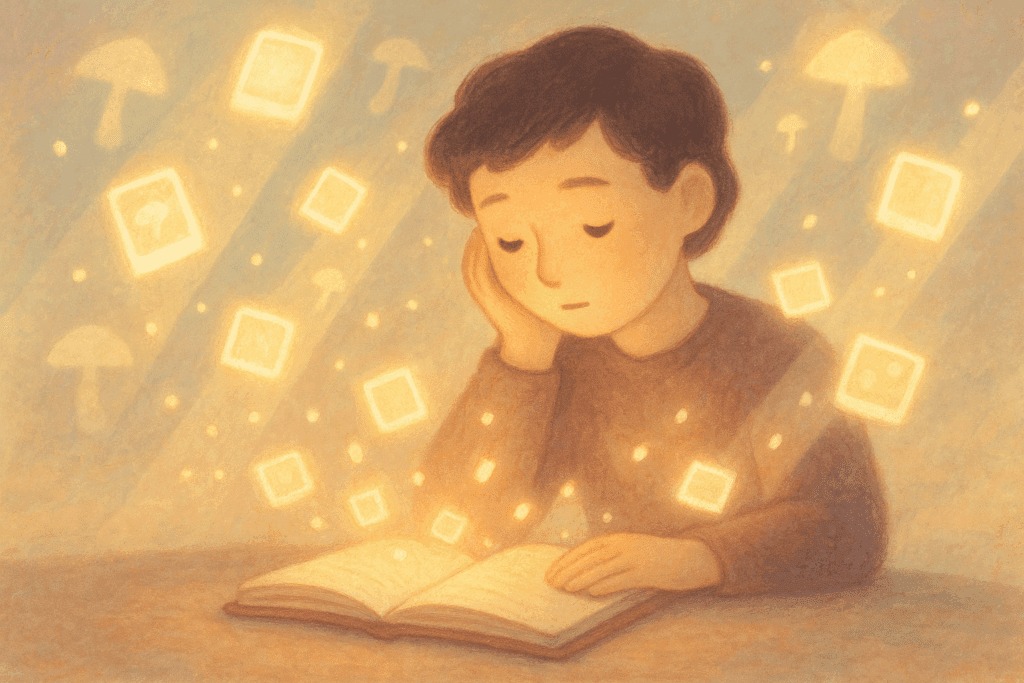
The Memory-Enhancing Potential of Body Feel Shrooms
One of the central questions among researchers and users alike is: are magic mushrooms good for you in terms of memory? While more clinical studies are needed, preliminary evidence and anecdotal reports suggest that psilocybin may support memory enhancement in several ways. First, by encouraging neurogenesis and synaptogenesis, body feel shrooms may help repair and rejuvenate areas of the brain involved in memory storage and retrieval.
Additionally, the reflective nature of a psilocybin mushroom trip often leads individuals to revisit past memories with new perspective. This introspective state can strengthen emotional associations with memories, making them more vivid and retrievable. Such experiences are especially promising for those dealing with trauma, PTSD, or age-related memory decline.
Furthermore, the integration of psilocybin into psychotherapy settings is yielding promising outcomes. Therapists have observed that clients who undergo guided psychedelic sessions often show increased recall of repressed or inaccessible memories, which can be crucial for healing and cognitive restoration. This begs the question: what does psilocybin feel like when used therapeutically? For many, it feels like reconnecting with fragmented aspects of their psyche, leading to a more coherent and accessible memory landscape.
Exploring How Body Feel Shrooms Improve Focus and Attention
While the dreamy, expansive nature of a shroom trip might suggest otherwise, body feel shrooms can also enhance focus and attention under certain conditions. The key lies in the setting, dose, and intent. In low to moderate doses—often referred to as microdosing—psilocybin has been reported to sharpen mental acuity, reduce distractions, and elevate task engagement. These benefits speak directly to those asking how do shrooms work when used for productivity or cognitive tasks.
Microdosing involves taking sub-perceptual amounts of psilocybin (typically 0.1 to 0.3 grams), which do not induce hallucinations but still exert subtle cognitive benefits. Users often report being more present, less reactive to stress, and more capable of entering flow states. These observations align with growing scientific interest in the potential of psychedelic microdosing to support cognitive enhancement without the drawbacks of traditional stimulants.
This nuanced approach addresses concerns about whether psilocybin is a stimulant. While psilocybin is not classified as a stimulant in the traditional sense, it does influence serotonin pathways that can lead to increased alertness, emotional resilience, and sensory acuity—effects that, in practice, can mimic aspects of stimulation.
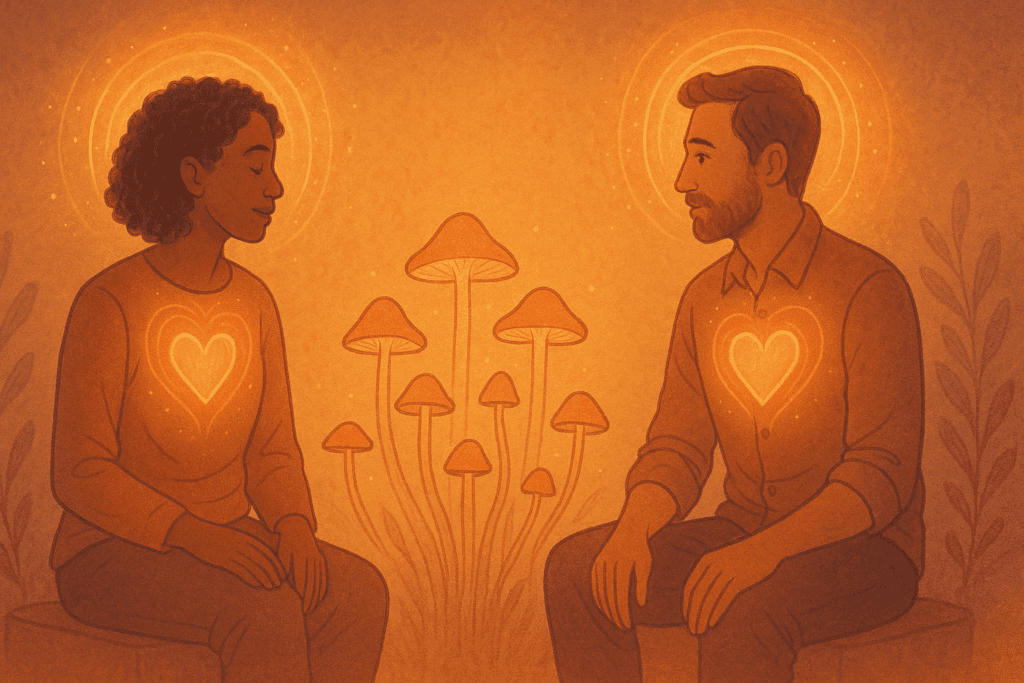
The Role of Body Feel Shrooms in Emotional Intelligence and Empathy
While memory and cognitive function are often the focus of discussions surrounding nootropic mushrooms, emotional intelligence plays an equally vital role in brain health. Body feel shrooms have shown remarkable promise in enhancing empathy, emotional clarity, and interpersonal sensitivity. Psilocybin appears to temporarily dissolve the barriers of ego, allowing individuals to connect more authentically with their own emotions and those of others.
During a typical magic mushroom experience, users often encounter deeply emotional insights that promote healing and self-awareness. These emotional breakthroughs are not merely side effects but rather core components of what makes psychedelic experiences so transformative. As individuals process emotions that may have been suppressed or unacknowledged, they develop a greater capacity for emotional regulation and interpersonal understanding.
This ability to enhance emotional intelligence has applications in therapy, conflict resolution, and even leadership development. Studies are beginning to explore how body feel shrooms might support social cognition and relational intelligence, offering new tools for navigating complex emotional landscapes. This further supports the growing body of evidence on the benefits of psychedelic mushrooms not just for personal growth but also for enhancing our collective emotional well-being.
Long-Term Cognitive Benefits and Neural Resilience
In addition to immediate enhancements in memory and attention, body feel shrooms may offer long-term cognitive protection. Emerging research suggests that repeated, responsible use of psilocybin could support the brain’s resilience to stress and age-related decline. These findings point to a broader concept of neural sustainability—maintaining brain health and adaptability over the lifespan.
One area of particular interest is the potential of psilocybin to reduce inflammation and oxidative stress in the brain, two key contributors to neurodegenerative diseases like Alzheimer’s. While human trials are still underway, early animal models have shown promising results. The ability of psilocybin to stimulate growth factors like BDNF (brain-derived neurotrophic factor) adds another layer of support for its neuroprotective potential.
These long-term benefits underscore a critical shift in how we think about nootropics. Rather than focusing solely on immediate boosts in productivity, body feel shrooms encourage a more holistic and sustainable model of cognitive health. This perspective aligns with broader wellness trends emphasizing longevity, prevention, and mind-body integration—transforming the way we approach brain enhancement in the 21st century.
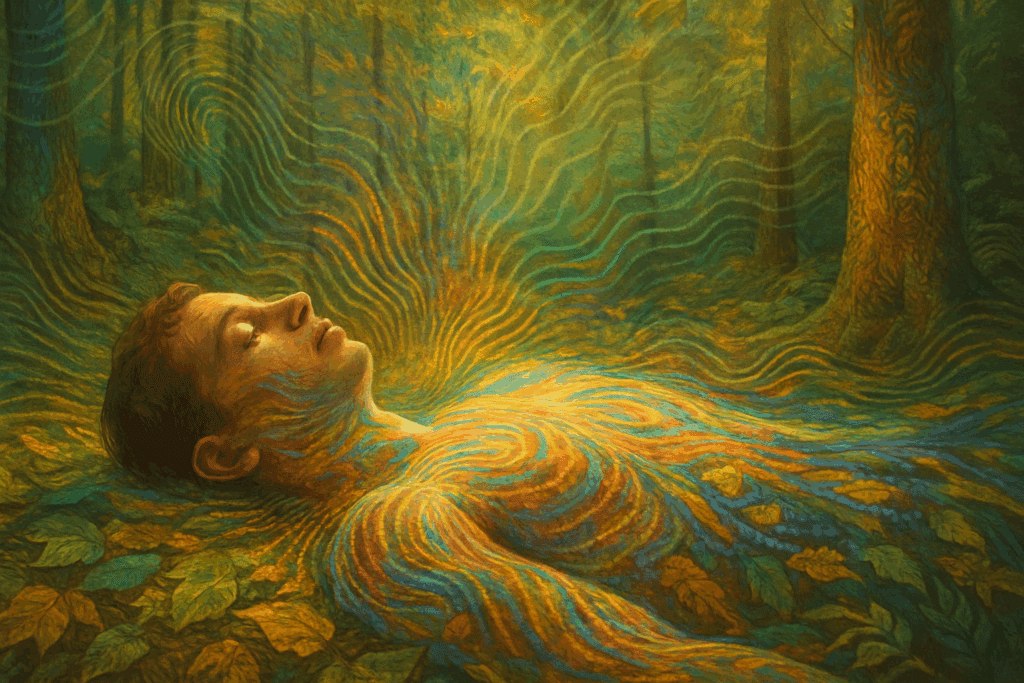
The Sensory Experience: What Does Psilocybin Feel Like?
Beyond memory and focus, body feel shrooms offer a rich sensory experience that is central to their appeal and potential benefits. During a psychedelic mushrooms trip, users commonly report enhanced sensory perception, including brighter colors, heightened textures, and intensified bodily sensations. This is where the term “body feel shrooms” becomes especially relevant, as the fungi appear to awaken a deeper connection between mind and body.
Many users describe a warm, pulsating energy that moves through the body, often accompanied by feelings of relaxation or euphoria. These sensations are not merely recreational; they can play a therapeutic role in helping individuals reconnect with physical sensations, process stored trauma, and achieve emotional release. Understanding what does mushrooms feel like requires acknowledging this embodied experience as a vital component of cognitive and emotional healing.
Additionally, the somatic awareness induced by psilocybin has been linked to improved proprioception and interoception—the brain’s ability to perceive internal body states. These enhancements may indirectly support cognitive performance by reducing stress, promoting relaxation, and improving sleep quality, all of which are essential for optimal brain function.
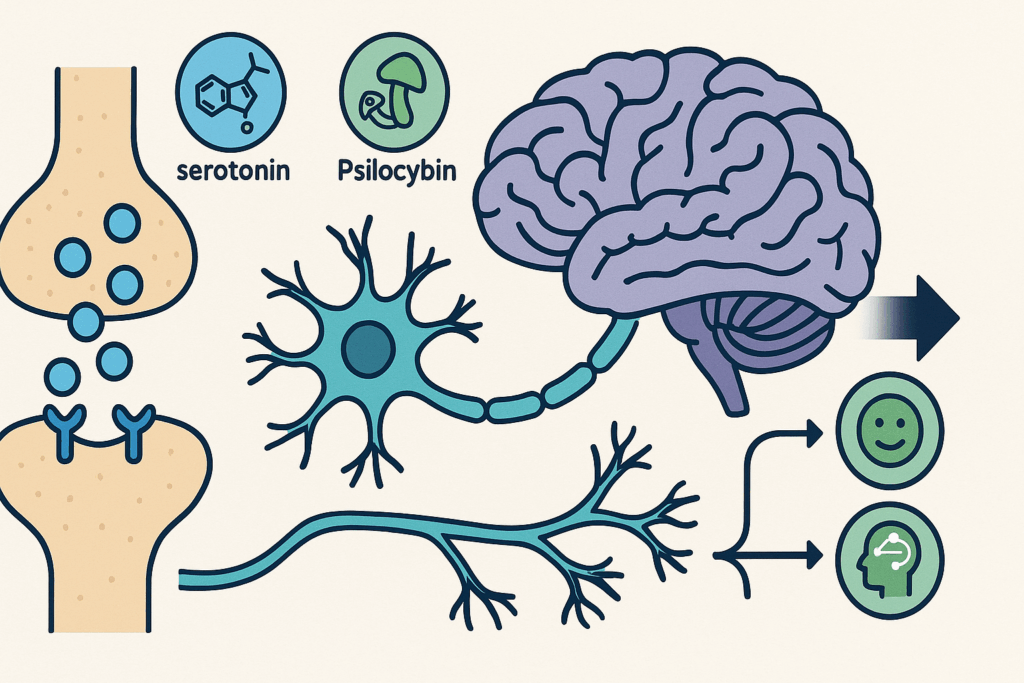
Neurochemical Mechanisms: Psilocybin and Serotonin Interaction
At the heart of psilocybin’s cognitive effects lies its interaction with serotonin, a neurotransmitter implicated in mood regulation, cognition, and perception. Psilocybin is structurally similar to serotonin and acts as a partial agonist at various serotonin receptors. This interaction has widespread implications for how the brain processes information, modulates mood, and forms memories.
Understanding psilocybin and serotonin connectivity provides insight into why psychedelic experiences can be both therapeutic and transformative. By modulating serotonin activity, body feel shrooms can create the conditions for increased neuroplasticity, emotional resilience, and creative thinking. These outcomes address long-standing questions such as what do psychedelic mushrooms do and how do they compare to other cognitive enhancers.
Moreover, this serotonin-based action distinguishes psilocybin from traditional nootropics that target dopamine or acetylcholine pathways. It also highlights psilocybin’s potential to support long-term brain health rather than just short-term performance. While the mushroom high associated with recreational use may seem unrelated to cognitive goals, the neurochemical foundation suggests otherwise. Psilocybin’s capacity to enhance brain structure and function over time sets it apart from transient, performance-driven stimulants.
The Safety and Legality of Doing Magic Mushrooms
As interest in psilocybin grows, so does the importance of understanding its safety profile and legal status. One of the most frequent questions asked by those new to the field is: are shrooms good for you? The answer depends on numerous factors, including dosage, setting, individual mental health history, and the presence of professional guidance.
Clinical research has consistently shown that psilocybin is physiologically safe, with a low risk of toxicity or addiction. Unlike substances that overstimulate the nervous system, psilocybin produces its effects through serotonin modulation, which reduces the risk of long-term damage or dependency. However, the psychological effects can be intense, and not everyone is suited for a psychedelic mushrooms trip without proper preparation and support.
Legal status remains a complex issue. While psilocybin remains a Schedule I substance under federal law in many countries, including the United States, certain regions have decriminalized or approved its use in therapeutic settings. Understanding what do magic mushrooms do to your brain is critical for policymakers and healthcare providers as they weigh the risks and benefits of broader legalization.
With the rise of psilocybin pills and professionally guided sessions, access is expanding in a more structured and informed way. This evolution supports safe exploration while minimizing potential harm. It also opens the door for future research and public education about the benefits of magic mushrooms in controlled environments.
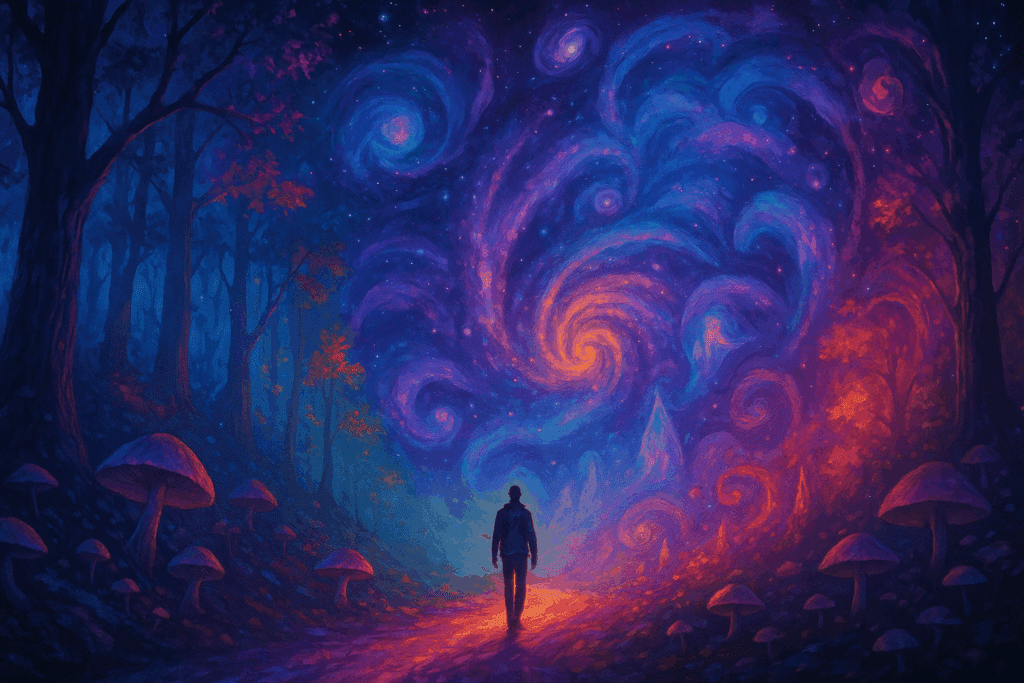
Exploring the Depths of a Magic Mushroom Trip
No exploration of psilocybin would be complete without delving into the magic mushroom experience itself. For those curious about what does magic mushrooms feel like, the answer is as diverse as the people who take them. Common themes include profound emotional insights, altered time perception, and a sense of unity with the world.
A typical shroom trip unfolds over several hours, beginning with mild sensory changes and deepening into an immersive journey that can range from introspective to ecstatic. This experience can be catalyzed by set (the individual’s mindset) and setting (the physical and social environment), both of which are essential for maximizing the positive effects of magic mushrooms.
While some may seek these experiences recreationally, many are drawn to their transformative potential. A psilocybin mushroom trip often results in a reorganization of cognitive priorities, emotional catharsis, and the development of new psychological insights. These outcomes are increasingly being validated by neuroscience, which confirms that psilocybin can alter patterns of brain activity in beneficial ways.
Importantly, these experiences are not isolated from the rest of one’s life. The integration process—reflecting on and incorporating the lessons from the trip—is crucial for lasting change. This is where psilocybin distinguishes itself from other nootropic agents: it offers not only cognitive enhancement but also a pathway to psychological growth and self-understanding.
The Future of Body Feel Shrooms in Cognitive Medicine
As research continues to uncover the full spectrum of psilocybin’s effects, the future looks promising for its integration into mainstream cognitive medicine. Current trials are exploring its potential in treating Alzheimer’s disease, depression, addiction, and anxiety—all conditions with significant cognitive components.
Moreover, innovations in delivery methods, such as psilocybin pills and microdose regimens, are making these benefits more accessible to a broader population. These formats reduce the intensity of a full psychedelic experience while preserving the cognitive benefits. For those asking what do shrooms make you feel in microdose form, the answer often includes clarity, calm, and creativity without disorientation.
With a growing body of evidence supporting the safety and efficacy of psilocybin, the debate is shifting from whether it should be used to how it can be responsibly integrated into existing medical and psychological frameworks. This paradigm shift is not only redefining the question are magic mushrooms good for you, but also challenging conventional notions of mental health treatment and brain optimization.
FAQ: Exploring the Benefits and Experiences of Body Feel Shrooms
1. What makes body feel shrooms different from other nootropic or psychedelic mushrooms?
Body feel shrooms stand out due to their unique combination of physical and cognitive effects. Unlike other nootropics that primarily target mental clarity or memory, these mushrooms evoke a rich tapestry of bodily sensations that deepen one’s awareness of internal states. The synergy between sensory enhancement and cognitive stimulation provides a more immersive experience, often described as both grounding and expansive. This makes them particularly useful for individuals practicing somatic therapies, mindfulness, or body-focused meditation techniques. Additionally, their influence on the vagus nerve may foster better emotional regulation and stress response, opening new frontiers in integrative mental health approaches.
2. How do body feel shrooms impact emotional processing during a psilocybin mushroom trip?
During a psilocybin mushroom trip, body feel shrooms often facilitate emotional breakthroughs by lowering defenses and amplifying introspective clarity. Users report experiencing unresolved emotions more vividly, which can catalyze therapeutic insights and emotional release. These effects are partly due to the way psilocybin modulates the default mode network, enabling more fluid communication between emotional and rational brain centers. This process often helps individuals identify patterns of self-sabotage or emotional repression they were previously unaware of. The result is a deeper integration of emotional awareness, which supports long-term psychological resilience and relationship health.
3. What do shrooms make you feel like in terms of social connection and empathy?
Many people report that during a psychedelic mushrooms trip, they feel more connected to others and exhibit heightened empathy. This may be due to increased activity in brain regions linked to emotional perception and mirror neurons. As a result, doing magic mushrooms can dissolve social anxiety and promote a sense of unity or shared humanity. This makes them valuable in couple’s therapy or group therapy contexts where building trust and emotional safety is critical. Such relational benefits also challenge traditional notions of what do psychedelic mushrooms do, expanding their utility beyond solo inner work to social and interpersonal healing.
4. Are magic mushrooms good for you in the context of long-term mental health?
Emerging evidence suggests that magic mushrooms, when used responsibly and under guidance, may support long-term mental health improvements. Studies show promise in treating conditions such as depression, PTSD, OCD, and even substance use disorders. One key advantage is their potential to create sustained neural changes, not just temporary symptom relief. Their capacity to reset dysfunctional brain circuits means users often describe a lasting lightness or clarity after a well-supported psilocybin mushroom trip. While more research is needed, early findings indicate the benefits of psychedelic mushrooms extend far beyond the high and may contribute to comprehensive mental wellness.
5. What does psilocybin feel like when microdosed for creativity and productivity?
When microdosed, psilocybin typically doesn’t produce hallucinations but fosters a subtle shift in perception and cognition. Users often experience improved problem-solving skills, heightened sensory perception, and a more positive mindset. This makes microdosing a popular strategy among entrepreneurs, artists, and professionals seeking a competitive edge without the crash associated with caffeine or amphetamines. It also supports a more playful, less inhibited thought process, unlocking novel ideas and patterns that might otherwise go unnoticed. The body feel aspect can aid in reducing physical tension, contributing to a relaxed yet focused flow state.
6. How does psilocybin influence the balance between cognitive logic and intuition?
Psilocybin is known to suppress overactivity in the brain’s analytical regions while enhancing connectivity in less dominant neural networks. This shift allows for greater access to intuitive insights and holistic thinking, helping users to process information in more integrated, meaningful ways. During a magic mushroom experience, many individuals report sudden realizations or epiphanies that feel emotionally and intellectually coherent. This dual activation of emotional and cognitive centers facilitates novel perspectives on longstanding challenges. It’s one of the reasons why those exploring what do shrooms do often describe a spiritual or philosophical breakthrough as part of the mushroom high.
7. Is psilocybin a stimulant or does it work differently from traditional energy enhancers?
Though not classified as a stimulant in the traditional sense, psilocybin does elevate energy levels and alertness through its interaction with serotonin pathways. This makes it fundamentally different from dopamine-based stimulants like caffeine or amphetamines, which carry a higher risk of dependency and physiological strain. The effects of magic mushrooms, including heightened awareness and sensory clarity, arise from increased cortical connectivity and serotonin activity. Users often feel energized yet calm, productive but not rushed—a rare blend that appeals to those managing high-stress or creative tasks. Understanding how do shrooms work in this context reveals a nuanced stimulant profile that supports both relaxation and focus.
8. What does mushrooms feel like in terms of physical sensation during a shroom trip?
Physically, a shroom trip often begins with sensations such as tingling, waves of warmth, or muscle relaxation. Some describe the feeling as a “body hug” or like being massaged from the inside out. These sensations contribute to the grounding experience of body feel shrooms, distinguishing them from more cognitively oriented psychedelics. Many also report heightened tactile sensitivity, improved proprioception, and even rhythmic awareness—useful in dance, movement therapy, or yoga. These rich physical effects are a key reason why users exploring what does magic mushrooms feel like often describe a deeply embodied sense of wellness and flow.
9. What do shrooms do to your brain that supports creativity and openness to experience?
Psilocybin has been shown to increase the personality trait known as “openness to experience,” which correlates with creativity, imagination, and aesthetic appreciation. By disrupting habitual thought patterns and enhancing neural plasticity, it allows users to form new associations between previously unlinked ideas. This rewiring supports flexible thinking and adaptive problem-solving—traits essential for innovation. Those undergoing a psilocybin mushroom trip frequently report a new appreciation for art, music, and nature, which can fuel creative passion and purpose. So, when asking what do shrooms do to your brain, it’s essential to consider not only structural changes but also their impact on worldview and behavior.
10. How are psilocybin pills changing the landscape of mental health and wellness?
The development of psilocybin pills has revolutionized the way people access and experience the benefits of magic mushrooms. Unlike raw mushrooms, capsules allow for precise dosing, greater consistency, and easier integration into clinical settings. This pharmaceutical approach supports more structured therapeutic programs and reduces the risks associated with improper preparation or uncontrolled environments. The accessibility of psilocybin pills also democratizes the magic mushroom experience, opening it up to individuals who may not feel comfortable with traditional psychedelic methods. As research and regulation continue to evolve, these innovations may play a vital role in mainstream acceptance and application of psilocybin magic mushrooms in health care.
Conclusion: Rethinking Cognitive Wellness with Body Feel Shrooms
The exploration of body feel shrooms marks a turning point in our understanding of cognitive enhancement. Far from being mere recreational substances, these fungi hold powerful potential for improving memory, focus, emotional resilience, and overall brain health. Through their interaction with serotonin pathways, promotion of neuroplasticity, and capacity to facilitate deep psychological insight, psilocybin-containing mushrooms are emerging as vital tools in the future of cognitive medicine.
For those still asking what do shrooms do or how does mushrooms make you feel, the answer is multidimensional. From the profound experiences of a full magic mushroom trip to the subtle clarity of microdosing, the spectrum of effects offers something for a wide range of cognitive and emotional goals. The key lies in responsible usage, proper guidance, and a willingness to engage deeply with both the mind and body.
In this age of growing mental health challenges and increasing cognitive demands, the benefits of psychedelic mushrooms offer a hopeful and scientifically grounded avenue for personal transformation. By embracing the therapeutic and nootropic potential of body feel shrooms, we may be opening the door to a new era of holistic brain health—one that honors both ancient wisdom and modern neuroscience.
